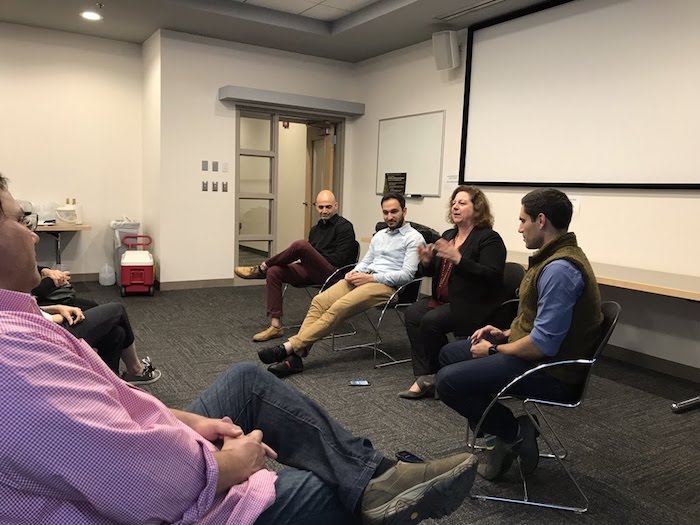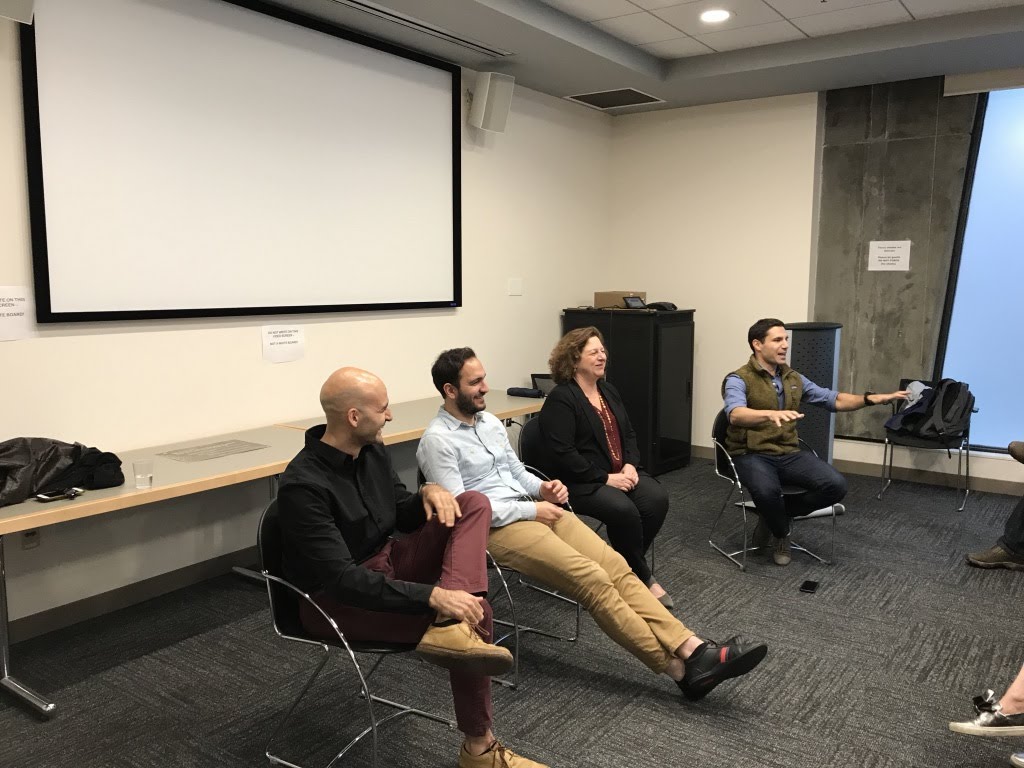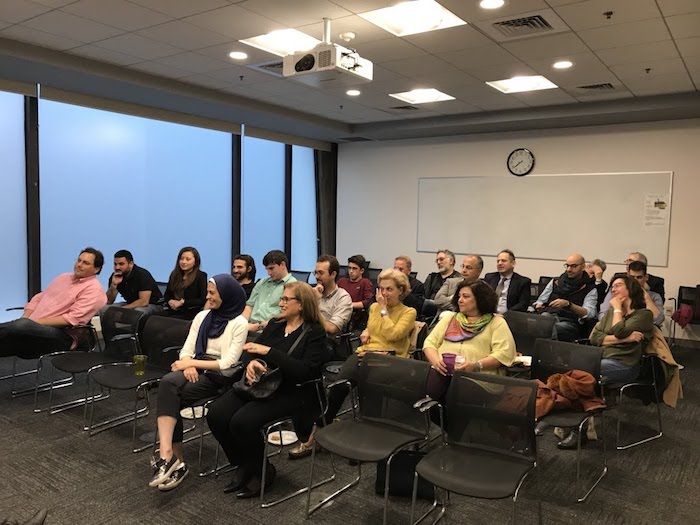The search to understand the complexities of the human body is endless. Scientists study, invent, test and fail for years before a small percentage of them are able to come up with an effective drug, cure or treatment for diseases.
The convergence of technologies in healthcare paved the way for new methods and tools that scientists can use, including wireless perception, nanotechnology and using AI to monitor, prevent and cure diseases.
To further discuss the newest technological advancements in healthcare, LebNet organized a talk in Boston on June 13th, at MIT’s 500 Technology Square attended by 30 members and guests, and featured the following speakers: Diala Ezzeddine, PhD, CEO of Xios Therapeutics, a biotech company developing a novel small molecule therapeutics capable of preventing tumors from evading the immune system; Fadel Adib, PhD, an Assistant Professor at MIT and the founding director of the Signal Kinetics research group at the MIT Media Lab; and Dr. Tarek Fadel, Assistant Director of the Marble Center for Cancer Nanomedicine at the MIT Koch Institute for Integrative Cancer Research.
The talk was moderated by Johnny Ghibril, Vice President of Data Science and Solutions Architecture at B-Yond.
Inventing an artificial pancreas
Adib’s research group at the MIT Media Lab develops technologies and algorithms for wireless perception and sensing. One of their inventions is an artificial pancreas. It is a batteryless micro-implant that can be digested or swallowed in the body. It is smaller than a Tylenol pill, as described by Adib, and wirelessly connects and communicates information from deep inside the body.
This process enables many applications, such as long term drug delivery, said Adib: “You take a pill once and it sits inside the stomach, then we’re able to trigger it over a very long period of time. It could be used to treat those who have Alzheimer [and forget to take their pills], it could be used for deep brain stimulation. We’re able to power it up and stimulate it without using a battery, because the battery requires invasive surgery to place it and remove it. This artificial pancreas can be used to sense the Glucose and Insulin level.”
The idea ambition goes beyond that.
“We also want to be able to do an early detection of diseases by monitoring the micro-implants. We hope to build the first in-body micro computer that is able to last for a very long period of time.”
For oncology, this technology could mean a number of things, according to Fadel:
“When you think about something as complicated as cancer, that you’re able to change the chemistry of the drugs so they can be delivered for a longer period of time, combine and synchronise multiple drugs in one formulation, this can really speak to the complexity of some tumors. The ability to get insights from the human body using small particulars help doctors delineate the tumors in your body better and see some lesions better when performing a surgery,” said Fadel.
 Teaching the body to get rid of abnormal proteins and cells
Teaching the body to get rid of abnormal proteins and cells
While Fadel and Adib’s talks focused on the technology itself, Ezzeddine tackled the biotechnology aspect: how her company aims to teach the immune system to fight cancer – knowing that the cancerous cells can mask themselves from the immune system – and how to recycle ‘marked’ protein cells.
Xios Therapeutics aims to generate cancer medications, based on the idea of harnessing the natural mechanisms by which cells degrade proteins.
“You ask why would our bodies recycle proteins? It’s because on the one hand you want to be able to change the cells from feeling mode to metabolizing mode to something else, you want to have reactions quick. You can express proteins and want them to do their job and when the state changes you want them to go away for others to be expressed. You have not only to express genes and turn them into proteins but also get rid of these proteins. There’s a sophisticated recycling system in the cell where any protein that gets marked, the recycling mechanism knows that it needs to get rid of that protein,” she explained.
Ezzeddine’s company looks at cancer and gene expression and how some proteins in the genes are overly or underly expressed and need to be stopped. The typical process for recycling them, she explained, is creating a small antibody compound that targets the particular protein that you want to get rid of. The compound gets ingested and it either modulates the protein, prevents it from functioning or changes its formation so it stops interacting with other proteins. However, the process is temporary and once the drug falls off the compound, the protein goes back to doing what it was doing.
To solve this issue, Xios is creating compounds that when they go inside the body or into a cell, they can hone in on the protein they want to get rid of, where one piece of the compound binds to the protein of interest and another one binds to a part of the machinery that recycles cells called E3 Ligases. “That’s the molecule we create. When it goes into the body, it binds your protein of interest, search for ligases, search for protein of interest, couple them and recognize another protein is there and therefore tags it for degradation and it gets degraded. You have a biology-based mechanism allowing you to get rid of proteins. So now you have a way of addressing a number of diseases, and we do it for cancer,” explained Ezzeddine.
The founder also talked about immuno-oncology, which works on preventing cancer from masking itself from the immune system.
Typically the immune system knows how to get rid of foreign bodies and does this very well. But the tumor prevents the system from doing that. So immuno- oncology looks at finding ways to trigger the immune system to recognize it’s being fooled by the cancer, and to unleash its power on the tumor. Ezzeddine said that the immuno-oncology findings led to the introduction of a few new drugs to the market 4 to 5 years ago.
“We create a drug that can go into the body is able to degrade the proteins of interest with the goal of trying to boost the ability of the immune system to recognize the cancer and get rid of it.”
Why do most healthtech discoveries fail?
As discussed in a previous LebNet Biotech event, most of the healthtech inventions end up failing, due to the high barriers to entry, high cost and long time to market,” according to Ghibril, or to the FDA long approval process and scaling manufacturing, according to Fadel.
There’s also the gender parity barrier, which excludes a big portion of women from the equation and leading to less innovative solutions. “Around 12% of digital health startups have women CEO,” added Fadel. Adding to that, Ezzeddine believed that the majority of discoveries fail during the late stage clinical trials, as “it’s really hard to predict on a large scale what’s going to happen compared to controlled environments in the early stages.”
Despite these barriers, the industry is constantly evolving and innovations in the immuno-oncology industry are coming to life. The accumulation of previous knowledge and the increased communication and openness between scientists are paving the way for additional research and breakthrough technologies.

